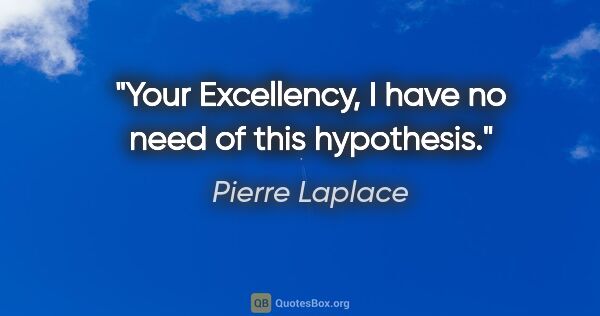Hypothesis Quotes
Keynes was a great economist. In every discipline, progress comes from people who make hypotheses, most of which turn out to be wrong, but all of which ultimately point to the right answer. Now Keynes, in The General Theory of Employment, Interest and Money, set forth a hypothesis which was a beautiful one, and it really altered the shape of economics. But it turned out that it was a wrong hypothesis. That doesn't mean that he wasn't a great man!
Milton Friedman

I remember an hypothesis argued upon by the young students, when I was at St. Omer's, and maintained with much learning and pleasantry on both sides, 'Whether supposing that the flavour of a big who obtained his death by whipping (per flagellationem extremem) superadded a pleasure upon the palate of a man more intense than any possible suffering we can conceive in the animal, is man justified in using that method of putting an animal to death?' I forget the decision.
Charles Lamb
Even facts become fictions without adequate ways of seeing "the facts". We do not need theories so much as the experience that is the source of the theory. We are not satisfied with faith, in the sense of an implausible hypothesis irrationally held: we demand to experience the "evidence".
R. D. Laing
If you don’t believe in the world, and if there is no love in it, then everything is phony. No matter which world we are talking about, no matter what kind of world we are talking about, the line separating fact from hypothesis is practically invisible to the eye. It can only be seen with the inner eye, the eye of the mind.
Haruki Murakami
Conceive the condition of the human mind if all propositions whatsoever were self-evident except one, which was to become self-evident at the close of a summer’s day, but in the meantime might be the subject of question, of hypothesis, of debate. Art and philosophy, literature and science, would fasten like bees on that one proposition which had the honey of probability in it, and be the more eager because their enjoyment would end with sunset. Our impulses, our spiritual activities, no more...
George Eliot
We cannot fathom the marvelous complexity of an organic being; but on the hypothesis here advanced this complexity is much increased. Each living creature must be looked at as a microcosm--a little universe, formed of a host of self-propagating organisms, inconceivably minute and as numerous as the stars in heaven.
Charles Darwin
There is no method of reasoning more common, and yet none more blameable, than, in philosophical disputes, to endeavour the refutation of any hypothesis, by a pretence of its dangerous consequences to religion and morality. When any opinion leads to absurdities, it is certainly false; but it is not certain that an opinion is false, because it is of danger-ous consequence. Such topics, therefore, ought entirely to be forborne; as serving nothing to the discovery of truth, but only to make the...
David Hume
The TV scientist who mutters sadly, "The experiment is a failure; we have failed to achieve what we had hoped for," is suffering mainly from a bad script writer. An experiment is never a failure solely because it fails to achieve predicted results. An experiment is a failure only when it also fails adequately to test the hypothesis in question, when the data it produces don't prove anything one way or another.
Robert M. Pirsig
For
the world is an ever-elusive and ever-disappointing mirage only from
the standpoint of someone standing aside from it—as if it were quite
other than himself—and then trying to grasp it.
But a third response is possible. Not withdrawal, not stewardship on
the hypothesis of a future reward, but the fullest collaboration with the
world as a harmonious system of contained conflicts—based on the
realization that the only real "I" is the whole endless process.
Alan Watts
Men became scientific because they expected Law in Nature, and they expected Law in Nature because they believed in a Legislator. In most modern scientists this belief has died: it will be interesting to see how long their confidence in uniformity survives it. Two significant developments have already appeared—the hypothesis of a lawless sub-nature, and the surrender of the claim that science is true. We may be living nearer than we suppose to the end of the Scientific Age.
C. S. Lewis
